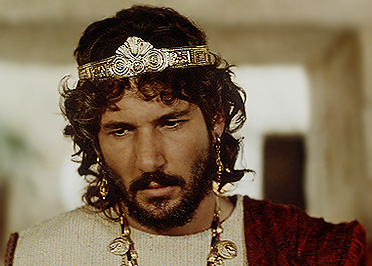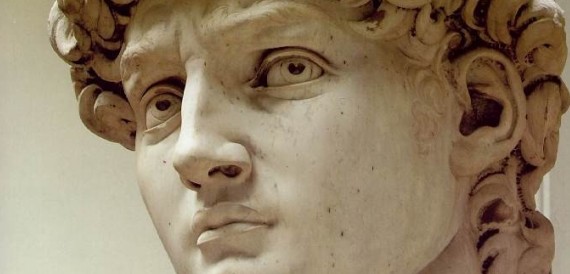|
Listen to this post:
|

The Bible holds many hidden wonders. In addition to its explicit teachings, by careful reasoning we can draw out many implications of what it says, by comparing various parts with others. Aided by various evangelical apologists and theologians, I’ve made a few discoveries which I am now privileged and humbled to share with the world.
Step 1: prove that Jesus is God
- When the prophet Isaiah says “Prepare the way of the Lord” (Isaiah 40:3) the “Lord” there is God, Yahweh.
- Mark applies this to Jesus; the “Lord” when he quotes Isaiah is Jesus. (Mark 1:3)
- Therefore, Jesus is God.
Step 2: prove that Jesus is David
- When the Psalmist says “The Lord says to my lord, ‘Sit at my right hand
until I make your enemies your footstool'” the words “my lord” refer to David. (Psalm 110:1) - When Luke (and Peter) quote this Psalm, “my lord” refers to Jesus. (Acts 2:34-36)
- Therefore, Jesus is David.
Step 3: tie it all together
- Jesus is God. (from Step 1)
- Jesus is David. (from Step 2)
- Therefore, David is God.
Lest you have doubts about the validity this third argument, be assured that 3 follows from 1 and 2. Things that are identical to the same thing (here, Jesus) must also be identical to one another (here, God and David). We have just proved the deity of David. Or, if you like, the Davidity of God.

Friends, the implications of this are astounding. Not only is Jesus God (Step 1), but we also know that he’s not the only incarnation of God (Step 3), and that reincarnation occurs, at least sometimes. (Step 2)
Now, I know what you’re thinking. “David sinned! He can’t be God!”
Friend, we must avoid rationalism, that lamentable habit of refusing to believe things one can’t understand. No, I don’t understand how God – a holy and perfect being- could commit sins of adultery and murder. But I choose to believe what the Bible says, as I’ve outlined above. I will not call God, the ultimate author of the Bible, a liar. I choose humility over rationalistic pride.
Perhaps you’ll reject this as a new innovation, as something absent from the Christian tradition. Well, Step 3 is just simple logic. And Step 2, which you’re objecting to, uses the same sort of reasoning as Step 1. You think Step 1 is mainstream, right? Sometimes implications take a while to be noticed, sometimes many centuries; I couldn’t say why these implications (Steps 2 and 3) weren’t noticed before. I suppose it could just be due my extraordinary intellectual humility that I have been blessed with making these awesome discoveries. It is all by God’s grace, of course.
(Disclaimer: this post is an illustration of the fulfillment fallacy, and is not to be believed!)

Psalm 110 is about David’s Lord, not about David.
As Jesus reasoned, the inscription ascribes authorship of the psalm to David. David would not call himself “My Lord.” He spoke prophetically of the Messiah. Your argument is fallacious.
On the opposite side of the spectrum, don’t forget that Peter the apostle is also Satan. Remember that Jesus said to him, “Get behind me, Satan”. And Peter did not argue or object. This is similar to Thomas calling Jesus God.
Yes, obviously, Peter is Satan and man – otherwise Jesus would not have said that. He is one person with a human nature and also a diabolical nature.
How terribly unsophisticated. It’s obvious that David qua human sinned. David qua divine did not.
Ahh… that makes sense! Deep, man. Deep.
This is fun.
Nebuchadnezzar is God because he is “the king of kings” and master of all the earth (Daniel 2:37-38). Jacob and Judah are God because they are served and worshiped by the peoples (Genesis 27:29, 49:8-12). David is God because he is worshiped alongside YHWH (1 Chronicles 29:20).
They are also paid the sins of the mankind, right ?
These did not pay for the sins of mankind, though David did atone for his own sins. The Maccabean martyrs atoned for the sins of Israel according to the 1st century Jewish writer of 4 Maccabees. Paul shares much of 4 Maccabees’ terminology in discussing the atonement.
If we assume traditional theological atonement theories in which Christ atones for all sin for all time in an ontological kind of way, I think you have a point. But I don’t think that is how the early Christian writers approached the atonement. They see it firstly as the death of an obedient man for the sake of a condemned nation, Israel. Jesus’ death allows for a faithful remnant to survive the coming apocalypse, to escape judgement in this life.
Btw sir i have question, sorry if this is not connected
Was jesus a mere man when he was born ?
@Dale,
Adonai said to Adoni ( Psalm 110:1).
David is “anointed” king and Jesus too. In fact, the meaning of ‘Messiah’ is “anointed.”
Your syllogism is null and void.
Yes of course. I realize Dale isn’t serious, he is simply trying to make a point about Trinitarian belief. Thanks for your thoughts I hope to hear from you again if the future. Take care.
Aaron,
Sorry forgot to say – Dale is of course rationalising with his ‘tongue in his cheek.’
-just to illustrate the absurdity of certain thinking.
Blessings
John
Aaron,
Tradition suggests that the court singer refers to the King … . Jesus in the Synoptic Gospels,
and assumes the Psalmist to be David -hence the Messiah must be someone greater than David.
Regarding the OT i’m afraid that I have a certain bias in these matters as I find the so called ‘prophetic’ scriptures very ‘forced’-.i.e. a ‘christological gloss’ has been applied to the Jewish scriptures which was not intended by the writers.
Sorry I can’t help !
God Bless
John
John, you rebutted a lot of Trinitarian arguments about the verse. I agree that reading 2 YHWHs into the text isn’t justified. All I was asking was, in the original context, was “my lord” a direct reference to David? Given that Dale’s argument above hinges on Psalm 110:1 intending to refer to David himself with the words “my lord” we would have to conclude that if this title referred to anyone else that Dale’s argument breaks down. Even you said it was actually about the future King who would come from the Davidic line and be crowned….so that would be not David right?
Aaron
Isn’t David the Oracle here?.
Isn’t ‘my lord’ the King of the Davidic line who is being addressed by YHWH, on the occasion of his coronation?
There is no doubt that ‘The Lord’ is superior to ‘my lord’ since the one is doing the ‘elevating’ and the ‘crushing’
This is clearly not YHWH talking to YHWH or
Two YHWHs talking. !
You will have noted that Christ refers to Psalm 110 when in Matthew 22 vs 41-45 He says
“How does David, inspired by the spirit, call him ‘lord’,…if David calls him how can he be be his son”
Two points
(i) The word ‘lord ‘ is used by a King to address a son
(ii)Why should it NOT be for the Messiah to have greater status than his famous and powerful father?
The Hebrew scriptures make it quite plain – this is ‘ adonai’ addressing ‘adoni .. Some trinitarians allege that the Jews have tampered with this verse by fiddling with the vowel points. The Septuagint Bible
confirms the Tanakh translation.
Blessings
John
Didn’t David write Psalm 110? Can we conclusively say that “my lord” in verse 1 refers to David if he wrote it?
Williams,
The Scriptures tell us, “The first man, Adam, became a living person.” But the last Adam–that is, Christ–BECAME a life-giving Spirit. However, THE SPIRITUAL IS NOT FIRST, but the natural; THEN the spiritual. [1Cor 15.45-46]
In the beginning of Matthew, and again in Luke, there are listed two different generations of Jesus. The first being of the spirit and the second being of the flesh! David had the Spirit of God. Jesus received that very same Spirit. Therefore, Jesus represents the image of man in God’s image from the beginning of time. David had this same spirit, but was not the Son of God. So Jesus was before David, in spirit because he was always in the heart of God. David lived like all of us live. He had wants and desires just as we do. Jesus was under total control of God, which is Spirit. When he declared that he could do nothing of his own will, he is saying that he is under total submission. He was baptized by John in water, but after that, The Holy Spirit of God entered him and he became our Christ. On the cross, he died and was no longer flesh and blood, but returned a living spirit that is with those who accept him today.
“love the Richard Gere as King David photo”
He looks like he’s feeling a bit ill about the arguments in the post.
“…the Davidity of God.” Sounds like a good title for a sermon;-)
So is Abraham (nasi elohim, Gen 23.6), along with: the rock (Is 51), master (Gen 24.27), messiah (Ps 105) and prophet (Gen 20.7).
PS love the Richard Gere as King David photo. :p
Comments are closed.